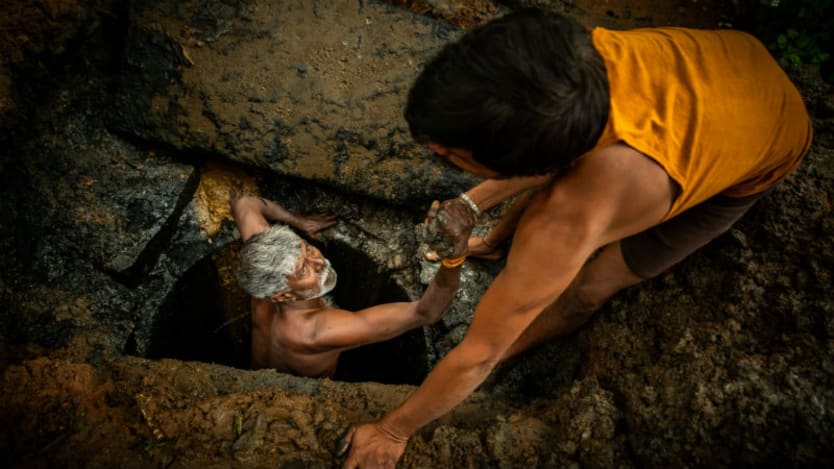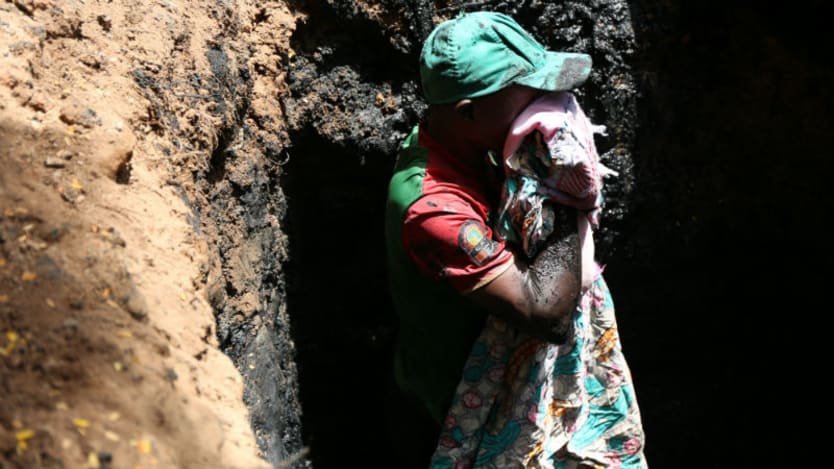In India, a sanitation worker dies every 5 days. Here's how to change that.

BARCELONA — Hazardous working conditions threaten the health of millions of sanitation workers in low- and middle-income countries, according to a new report — yet more workers are needed if Sustainable Development Goal 6 on access to clean water and sanitation is to be achieved.
In India, between 2017 and late 2018, one sanitation worker died every five days.
“A lot of them have been dying in the sewers in India because we haven’t put any money into fixing the pipes, getting them better technology and better safety gear,” said Anahitaa Bakshi, knowledge manager at Dalberg, a collection of businesses seeking to champion inclusive and sustainable growth globally. “But without them, we won’t be able to live in cities or even villages in a clean and healthy way.”
On World Toilet Day, a report by the International Labour Organization, WaterAid, the World Bank, and the World Health Organization is calling for more concerted efforts by all sector actors to improve working conditions.
“Without [sanitation workers], we won’t be able to live in cities or even villages in a clean and healthy way.”
— Anahitaa Bakshi, knowledge manager, DalbergThe issue hasn’t been taken seriously enough and needs to become a priority if we are to achieve the SDGs, said Andres Hueso, senior policy analyst for sanitation at WaterAid.
Other countries with poor working conditions for sanitation workers — including Tanzania, Bangladesh, and Burkina Faso — likely have figures similar to or worse than India’s, Hueso said, but a lack of data suggests the issue isn’t being talked about.
Globally, 673 million people openly defecate while a further 881 million have toilets that do not “hygienically separate human waste from contact with people.” Known as “frogmen,” “sweepers,” or “scavengers,” sanitation workers provide an essential public service by emptying septic tanks, unblocking sewers, and cleaning toilets.
But they risk coming into direct contact with human waste and are exposed to illnesses such as cholera, typhoid, hepatitis, and polio. Toxic gases in septic tanks and sewers can lead to a loss of consciousness or even death.
Often informal workers, sanitation workers in LMICs have little in the way of safety equipment, labor rights, and social protection. Workers often face societal stigma and inconsistent income.
“You have no paper to show that this is your profession,” said Wendgoundi Sawadogo, a manual emptier in Ouagadougou, Burkina Faso, adding that there is no trace of the work you’ve done.
Bakshi said government employment of sanitation workers would mean benefits such as health insurance. Instead, in India, they are hired by government contractors.

How to address the hazards
For development agencies and donors, the report recommends that the rights and welfare of sanitation workers be embedded into all urban sanitation programs — something the World Bank has begun taking steps toward, according to Jennifer Sara, global director of the World Bank’s Water Global Practice.
There is also a clear demand for governance, Hueso said. New or updated laws and regulations must ratify relevant international labor standards and end manual scavenging. Such laws must then be implemented properly via inspections and a system of fines.
In India, despite a 1993 ban on manual scavenging, over 20,500 people were identified as manual scavengers in 2018. According to the law, dry latrines should be switched to water-seal latrines, which don’t need to be emptied, and manual scavengers should be supported in finding alternative employment.
Effective contract designs for workers that include hospital visits, sick leave, and days off are also essential, Bakshi said, adding that this should be communicated to workers via a visualized diagram that can be easily understood by those who are illiterate. “This is an easy win. It doesn’t require a lot of funding and it’s something that NGOs or foundations can participate in.”
Governments should also offer rehabilitation and alternative livelihoods, formalize sanitation work, and support sanitation workers through unions and associations, according to the report.
Guidelines on proper sanitation management and health, such as WHO's, could give countries a starting point for improving sanitation systems and best practices.
Bakshi said there are other low-cost interventions that could safeguard workers’ health — providing harnesses instead of ropes for those entering sewers, for example, and opening a sewer 30 minutes before a person goes inside to avoid asphyxiation — though governments often don’t do enough to invest in them.
Calling it a public health issue, she said that if governments can focus on mechanizations, rewriting laws, and providing funding to improve conditions, then the private sector, foundations, and NGOs can focus on awareness building and behavioral change.
But unless the perception of sanitation workers as second-class citizens changes, governments won’t be pushed to act, Hueso said. “Because of this, there is no public outrage when accidents happen and there is very little push from the electorate or public on the authorities to do something about it.”
Particularly in India and Bangladesh, handling human waste is seen as a job for members of the Dalit caste, explained Riad Imam Mahmud, Bangladesh country director at The Max Foundation, an organization working to prevent child mortality through water, sanitation, and hygiene initiatives. Excluded from many workplaces and schools, they are viewed as among the lowest of the caste system.
The Max Foundation works with members of the Dalit community to train them on safe fecal-sludge management and limit the risks they face. But real improvement to working conditions will only come when governments push for such outcast communities to be accepted into workplaces and provide proper training, Mahmud said.
Search for articles
Most Read
- 1
- 2
- 3
- 4
- 5
